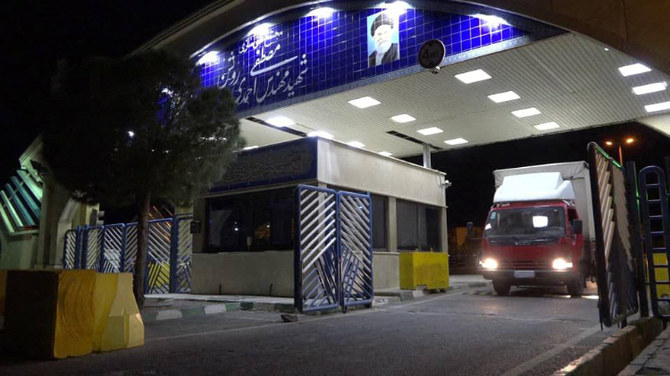West should remind Iran of its vulnerabilities

https://arab.news/r5qmp
Once again, American and European negotiators gather to try to reach terms with Iran. They hope to prevent the country from acquiring nuclear weapons, which it has been on the threshold of doing for months, if not years.
Any optimism felt by the negotiators at the beginning of the process has long since gone. Each week is called a vital one by all concerned and a deal is always just out of reach. Hard work persists, but few conclusions are ever reached.
Many negotiators privately conclude that Iran does not want a deal. It is almost a nuclear power. It has an expanding and increasingly decisive proxy network operating across the entire Middle East region. A new deal would be nice. It would bring in sanctions relief, perhaps a route to newfound prosperity. But for the Iranian leadership, a deal would only be an ornament to a system they like very much as it is.
Iranian militias happily operate in at least four countries. In Lebanon, Hezbollah dominates and paralyzes the state. In Syria, the Assad regime remains in power at Iran’s word — a pliant part of its “axis of resistance” to Israel, the US and the world at large. Yemen’s Houthis fire Iranian missiles at Saudi Arabia and now the UAE; no one outside the region seems very interested in stopping them. And in Iraq, a country increasingly pulled apart by civil discord, Iranian allies sit atop key government ministries, with their heavily armed supporters taking to the streets to crush or control any displays of popular discontent.
If you had a revolution to spread, as the Iranian leaders surely believe they do, could you ask for a more attractive environment in which to do it?
But the world still has some cards to play. Iran’s economy is poor and it is heavily dominated by the Islamic Revolutionary Guard Corps. The threat of further sanctions would affect the wealth of the Guards, and its leaders. This is something of an incentive to make terms.
With very little extra effort from the US and the European powers, Iran’s entire imperial project could be destabilized
Dr. Azeem Ibrahim
More widely, Iran’s networks may be wide-spanning and increasingly well entrenched, but they are brittle. Bashar Assad is unsafe in Syria and the militias that keep him there were unable to take the north of the country after a brief show of force from Turkey in 2020. One NATO-standard military, standing alone, decisively stopped the full force of Iran’s regional project from capturing Syria’s north. There are lessons here for the US and Europe.
If America and its allies were serious, they could make credible threats against the survival of Assad and these militias. If Iran wanted to keep them, they would be prepared to seek better terms.
In Lebanon, there is real mileage in political reform. The country is poor and badly governed and the politicians — including Hezbollah — are unpopular. When French president Emmanuel Macron arrived after the Beirut explosion and promised to rebuild Lebanese politics, he was briefly wildly popular. He failed to follow through, but Europe as a whole, or the US, could show more willing. Very soon, and with a little external support, true democrats could undermine Hezbollah’s stranglehold on Lebanon at the ballot box.
In Iraq, the US faces a mutating and cynical patchwork of militias, which not infrequently attack the American embassy and the international presence on Al-Asad airbase. Washington has bared its teeth before, killing Qassem Soleimani and Abu Mahdi Al-Muhandis in Baghdad in January 2020. Other militia leaders plot to kill Americans every day. The US could easily show the Iranians that it knows where they live.
In Yemen, the world could return its eye to the ball. The Houthis perpetually seem on the brink of taking Marib and ushering in a new episode of retaliatory violence. It would only take a word from Joe Biden to say that his country would not stand for this and can — furthermore — no longer tolerate the ballistic missile campaign launched from Houthi territory to destabilize the global oil economy.
With very little extra effort from the US and the European powers, Iran’s entire imperial project could be destabilized and shaken. Rather than strong and imperious, Iran could be made to feel overexposed and foolish. No doubt, this would produce happy results at the nuclear negotiating table.
At a time of economic hardship, many in the US and Europe think they need the Iranians all the more. This is untrue. Iran’s militia network is a destabilizing force that has the global economy in its sights. Letting Iran know that this network is, in fact, quite vulnerable to the disapproval of the democratic world can have only positive effects.
• Dr. Azeem Ibrahim is the director of special initiatives at the Newlines Institute for Strategy and Policy in Washington D.C. and author of “The Rohingyas: Inside Myanmar’s Genocide” (Hurst, 2017). Twitter: @AzeemIbrahim









































